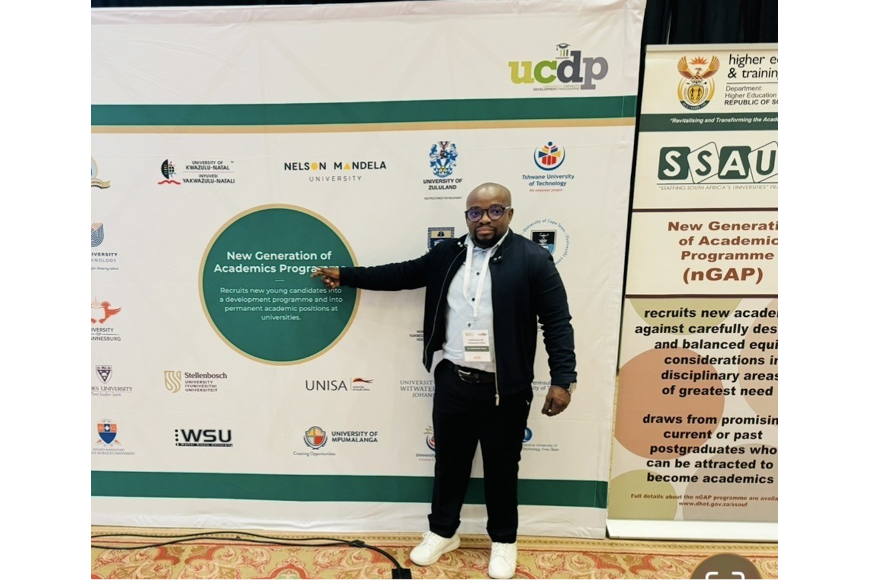“I have been awarded an NRF Y2 rating, the first for our department and one of the few in the field of radiography. The recognises the quality, consistency, and impact of my research outputs in advancing knowledge and professional practice,” said an elated Dr Thandokuhle Khoza.
Dr Khoza has been part of the Durban University of Technology (DUT) since 2017 under the Next Generation Academics Programme. Since joining, he has undertaken multiple roles and has been serving as Acting Head of the Department of Radiography since 2022.
“My research primarily focuses on diagnostic radiography, radiographers’ well-being, clinical education, and patient care pathways. I have published extensively in DHET-accredited journals, including Radiography, Journal of Medical Imaging and Radiation Sciences, and Health SA Gesondheid, with topics ranging from emotional intelligence in radiography students, musculoskeletal disorders, job satisfaction of radiographers, to breast cancer screening in rural communities,” he emphasised.
Additionally, his research is cited in both Google Scholar (h-index 5), with a citation of 83 and on Scopus (h-index 4), with a citation of 24, indicating growing recognition and influence within the academic and professional community.
Currently, Dr Khoza is engaged in local and international collaborative projects, including a Patient Journey Audit Tool with Australian partners, multi-institutional studies on student emotional well-being during work-integrated learning in South Africa, and COIL (Collaborative Online International Learning) projects with international universities, which integrate undergraduate student participation for global exposure.
He indicated that this will help prepare students to become global citizens, in line with the institutions objectives of internationalisation.
Sharing his inspiration in his area of study, Dr Khoza explained that his current research focuses on improving the professional experiences of radiographers and radiography students, with a strong emphasis on emotional well-being, clinical education, and patient-centred care. “
The inspiration stems from observing the challenges faced by radiography professionals and students in South Africa, particularly during clinical placements and high-stress environments such as the COVID-19 pandemic. By investigating these areas, I aim to develop models and interventions that enhance, resilience, and professional competence, which are critical for both healthcare delivery and student success,” he highlighted.
For Dr Khoza, he expressed how vital is it for his research to align with the objectives as outlined in the DUT ENVISION2030 strategy.
“Through projects such as rural breast cancer screening initiatives, workplace well-being studies, and international collaborations, my work contributes to capacity building in healthcare, improving community health outcomes, and fostering global engagement. Moreover, my research supports DUT’s mission to be a leader in applied, research-informed education, producing graduates who are well-equipped for the demands of a dynamic healthcare environment,” he shared.
For Dr Khoza, collaboration is central to his research, where he has ongoing collaborations locally and internationally. “Internationally, I have partnered with universities in Amsterdam and China (XJTLU), to implement COIL projects. In addition, I have an ongoing collaboration to conduct a patient audit trail as they move around in the radiology department. and patient care studies,” he said.
Locally, Dr Khoza shared that he works with all South African institutions offering radiography to examine emotional well-being and clinical education. “This included the students’ experiences during the July 21 civil unrest, as our students continued with clinical training,” he echoed.
Looking ahead, some of Dr Khoza’s future research goals include developing innovative teaching and learning frameworks that integrate AI, virtual simulations, and inclusive pedagogies; and addressing healthcare inequalities by designing interventions for underserved rural communities. “These goals are closely aligned with DUT’s ENVISION2030 strategy, particularly in advancing applied research, fostering innovation, supporting sustainable development, and creating meaningful societal impact,” he said.
Pictured: Dr Thandokuhle Khoza
Waheeda Peters

